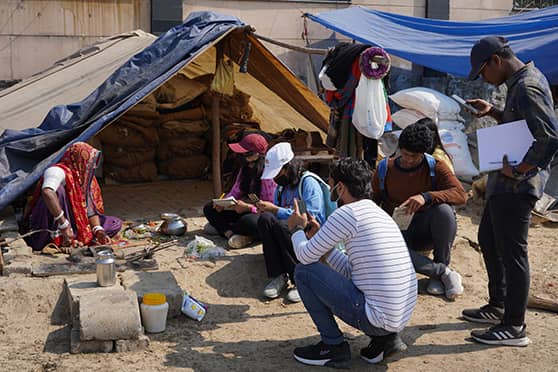WUD Architecture students draw inspiration from nomadic Rabari tribe


The School of Architecture at the World University of Design (WUD) , Haryana organised a visit to a Rabari tribe settlement to help students understand different aspects of their lives.
Understanding the culture and context of clients is an important skill architects need to develop. The field visit was a step in that direction for the Bachelor of Architecture (BArch) students.
“Spontaneous settlements are a part of the curriculum,” said Shaleen Sharma, dean, School of Architecture, WUD. “In the past, we have taken our students to study settlements in Dholavira, McLeod Ganj and other places. Because of the pandemic, we have not been able to organise these trips in the past two years. Instead, the students visited the Rabari settlement near the campus to study their culture.”
Rabari is an indigenous nomadic tribe that travels across north-western India. For centuries, groups belonging to the Rabari tribe have been living and travelling across Rajasthan, Gujarat, Punjab and Haryana along with herds of camels, sheep and cows.
“It felt like we had entered a different world. From when they sleep to their meals, the people have very different lives from us. They share close bonds with their cattle and even know the names of each of the 150-200 cows they have,” said Dipsi, second year, BArch, WUD.
The Rabaris travel from Jalore, Rajasthan, to Sonipat, Haryana. The tribe conducts trade with local villages and sell milk to earn money.
Students formed groups to study the logistics of their travel to the socio-economic impact on villages near their settlement. The students have to present their report, compiling a holistic study on the Rabari tribe.
“The way the Rabari people adapt to the community they settle in temporarily was a remarkable revelation for us. Yet, they hold on to their traditions strongly. They are comfortable with their way of life and are not very keen on change. Studying them exposed us to the different mindsets that exist beyond what we know,” said Chandrika Poranki, second year, BArch, WUD.
“It was refreshing to see people who enjoyed what they did. Even while performing small tasks, they always had a smile on their faces. Finding positivity and being passionate about our work is something that we should learn from them,” said Arshina Akhter, first year, BArch, WUD, about the deep impact the interactions had.
Sanjay Gupta, Vice-Chancellor, WUD, said the university ensures that students are never denied avenues and prospects that can make their learning more experiential and promote growth. “I am overjoyed to share that while we endeavour to provide such opportunities to the students, we can execute them because of their inquisitiveness and zeal for learning. It is a thrilling experience to watch young students participate and give their 100% with a goal to emerge as more knowledgeable and evolved,” he said.